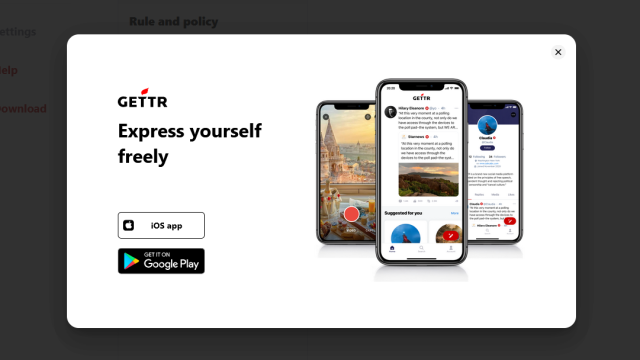Last month, members of Donald Trump’s insufferable inner circle launched GETTR, a half-assed and poorly built Facebook/Twitter clone that previously seemed to mostly serve as a vanity project for a far-right, fugitive Chinese billionaire with a cult-like following.
It was meant to serve as a place where Trump supporters could gather and frolic, free of the supposed censorship on other sites. Par for the course, it was promptly hacked, not to mention flooded with hentai porn. Now it’s flooded with Islamic State propaganda and beheading videos, according to Politico.
Politico wrote that GETTR has become filled with “graphic videos of beheadings, viral memes that promote violence against the West, and even memes of a militant executing Trump in an orange jumpsuit similar to those used in Guantanamo Bay.” While GETTR doesn’t have features that would allow reporters to track how such materials spread across the site, Politico wrote it found at least 250 accounts involved in spreading such material:
“Is Daesh here?” asked an account whose profile photo was of the Islamic State flag account, using the Arabic acronym for jihadi movement. The replies were in the affirmative, with some praising the social network for its willingness to host such content.
Days after GETTR was launched on July 1, Islamic State supporters began urging their followers on other social networks to sign up to the pro-Trump network, in part to take the jihadi fight directly to MAGA nation… “If this app reaches the expected success, which is mostly probable, it should be adopted by followers and occupied in order to regain the glory of Twitter, may God prevail,” one Islamic State account on Facebook wrote on July 6.
Another account named in reference to the Islamic State wrote, “We will come at you with slaying and explosions you worshippers of the cross… How great is freedom of expression.”
The pro-Islamic State content is a small percentage of the overall content on GETTR, which includes posts from conservative pundits like Sean Hannity, neo-fascist groups like the Proud Boys group, and a slew of miscellaneous Trump supporters. What’s more notable is that the accounts appear to have been attracted specifically by site administrators’ claims that GETTR is a free-speech haven with little to no moderation, something that became apparent during the porn incident and seems to still be being borne out today. Politico reported that even after informing the network of accounts promoting terrorism, no apparent action was taken against many of them.
Jason Miller, the former Trump spokesperson who left the ex-president’s employ to become CEO of GETTR, claimed to Politico that Islamic State accounts were only on the site the seek revenge on Trump via guilt by association.
“ISIS is trying to attack the MAGA movement because President Trump wiped them off the face of the earth, destroying the Caliphate in less than 18 months, and the only ISIS members still alive are keyboard warriors hiding in caves and eating dirt cookies,” Miller told Politico. He added the site’s moderation team maximizes “cutting-edge A.I. technology and human moderation.”
Many major social media networks rely on the Global Internet Forum to Counter Terrorism, a sort of industry-funded clearinghouse that shares information about content promoting terrorism between major players ranging from Facebook, Microsoft, Twitter, and YouTube to smaller platforms like Tumblr and Discord. (It’s controversial, with digital rights nonprofit the Electronic Frontier Foundation arguing that it could undermine freedom of expression by serving as a single database from which much of the internet could be censored.) Adam Hadley, the director of Tech Against Terrorism, told Politico that the stuff popping up on smaller sites like GETTR is “basically similar to the content that is being automatically removed from Facebook and Twitter.”
Despite efforts by those larger companies, extremist groups like the Islamic State still evade bans and simply resume posting from other accounts. In other cases, the focus on certain types of terrorist content hasn’t been matched for others, such as Facebook’s years-long decision to ignore violent, far-right rhetoric brewing on event pages and in Groups. New formats also pose opportunities for extremists to find new soapboxes. Audio chat app Clubhouse, which has been criticised for its loose moderation policies and faces difficulties in monitoring live conversations, was reported last month to have a significant presence by the Taliban.
